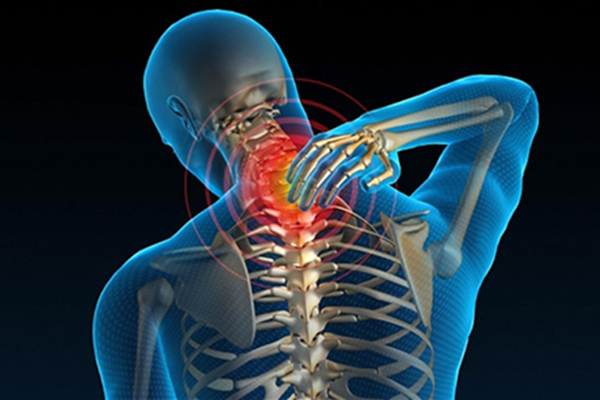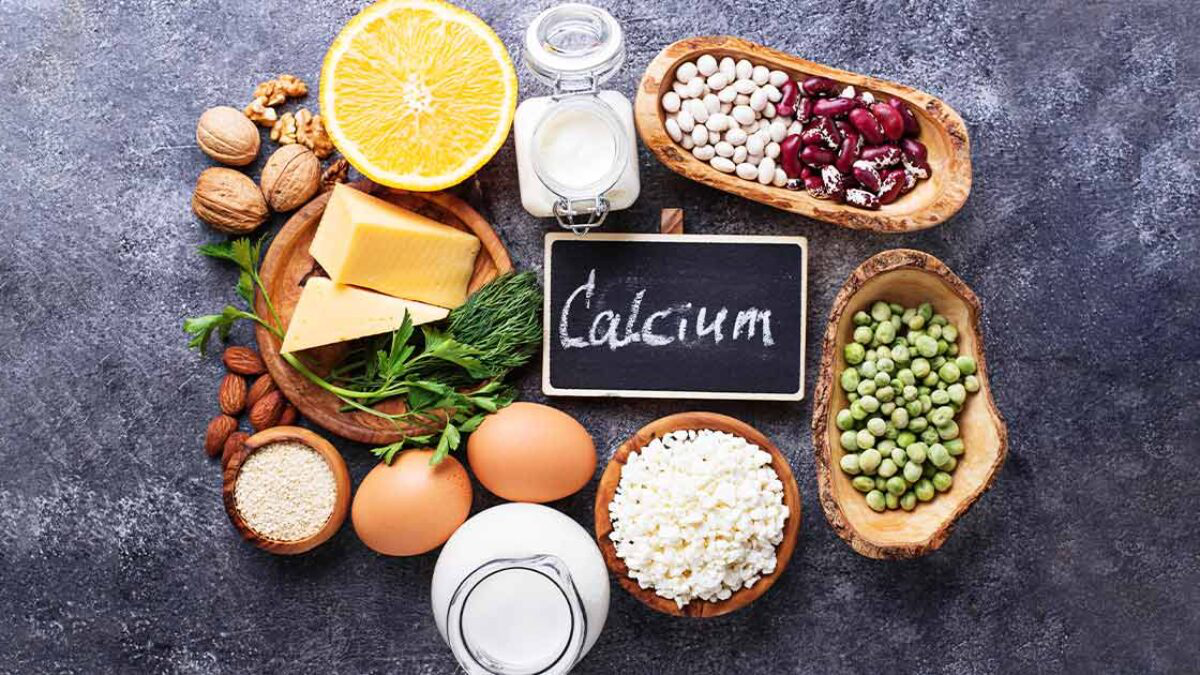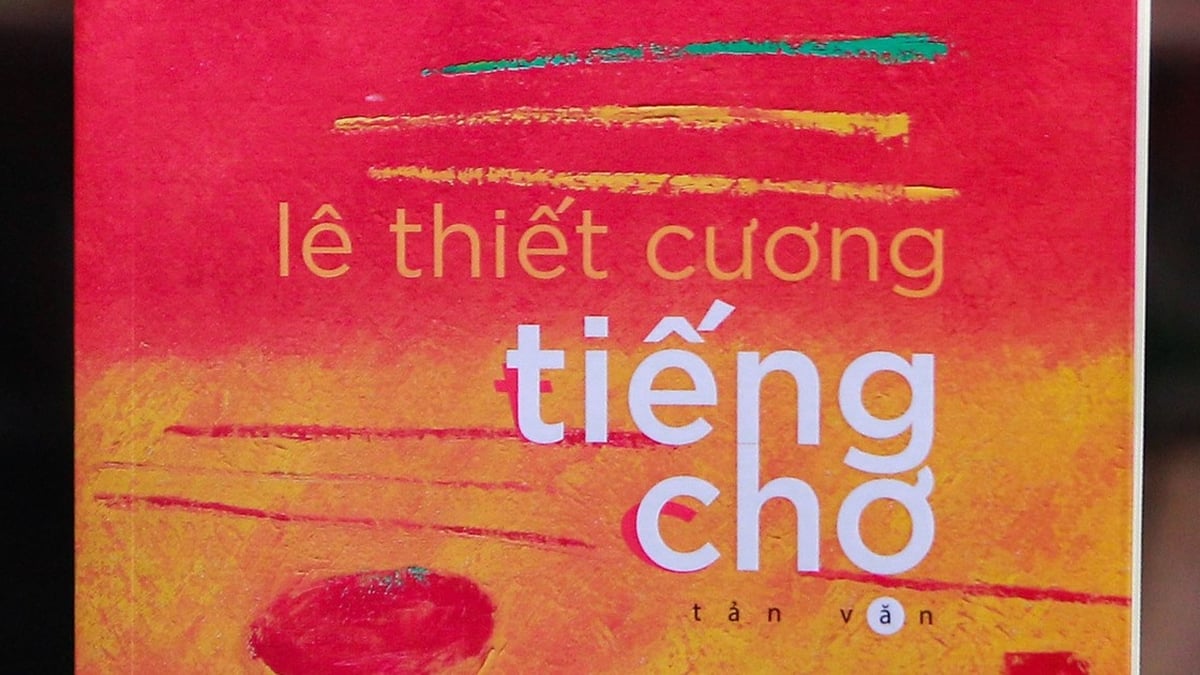1. The importance of diet for people with spinal calcification
Spinal calcification is a condition in which calcium minerals deposit and accumulate in the vertebral bodies, spinous processes, and transverse processes, causing severe compression of the central nerves and sensory organs, causing pain in the neck and back.
This disease often occurs in the elderly due to the aging process, however, many young people also suffer from it due to improper living and exercise habits such as: sitting in one place for many hours continuously, little exercise; carrying heavy loads, incorrect posture when working. Obese and overweight people make the spine susceptible to compression, leading to calcification in the lumbar spine...
In addition, an unreasonable diet, inadequate nutrition, and insufficient calcium supplementation cause bones to lack nutrients or too much supplementation causes excess calcium, causing calcification of the spine.
When diagnosed with spinal calcification, in addition to taking medication as prescribed by a specialist, patients need to pay attention to combining diet, proper exercise and maintaining a suitable weight.
Nutrition plays a vital role in supporting bone health, including the spine – an often overlooked component of spinal health. By maintaining a healthy lifestyle and diet, the risk of developing bone, spinal and osteoporosis diseases is reduced.
Diet plays an important role in supporting the treatment and minimizing the symptoms of spinal calcification. Eating a balanced diet and choosing the right foods will help provide essential nutrients for bones and joints, helping to regenerate and restore cartilage; Reduce inflammation and pain; Improve spinal mobility while preventing disease progression.

Spinal calcification causes pain in the neck and back.
2. Essential nutrients for people with spinal calcification
Eating a balanced diet and supplementing with foods rich in the right vitamins and nutrients can reduce pain and damage by nourishing the bones, muscles, discs, and structures in the spine.
Calcium
Calcium is the most important mineral for bone and spine health. It helps maintain the necessary level of bone mass throughout life.
Adequate calcium intake is especially important to prevent the development of osteoporosis, a disorder characterized by weak, brittle bones that can lead to fractures of the vertebrae in the spine.
Calcium is found in many foods, most commonly in dairy products such as yogurt, cheese, and milk. Other common sources of calcium include dark green leafy vegetables such as kale, bok choy, beans, some fish such as sardines, salmon, and many other foods such as almonds, oranges, tofu, etc.
However, calcium alone will not make bones strong. Calcium must be combined in balance with other nutrients for strong bones.
Magnesium
Magnesium is an important mineral in the structure of bone matrix and is also necessary for more than 300 biochemical reactions in the body. If the magnesium level in the blood drops, magnesium will be pulled from the bones.
Magnesium deficiency is common, and magnesium supplementation can help maintain bone density. This nutrient also helps relax and contract muscles, strengthening the muscles that support the spine.
Magnesium is found in green leafy vegetables, fish, beans, seeds, nuts, whole grains, yogurt, avocados, bananas, and dark chocolate (70% cocoa or more).
Vitamin D3
Vitamin D3 helps the body absorb calcium, which is important for bone and spine development. Without enough vitamin D, bones can become thin, brittle or deformed.
Vitamin D is found naturally in a number of foods including fatty fish (salmon), liver (or cod liver oil), egg yolks, or some dairy products, cereals, juices, and cakes fortified with vitamin D.
Vitamin K2
Vitamin K2 plays a role in regulating bone minerals, properly distributing calcium out of soft tissues and into bones. It is important for healthy bone metabolism and is often lacking in the diet.
The combination of vitamin K2 and calcium helps keep bones in the spine and throughout the body strong. Vitamin K1 is the plant form of vitamin K, which is converted to vitamin K2 by healthy digestive bacteria.
Vitamin K1 is found in green leafy vegetables such as spinach, kale, and broccoli. Vitamin K2 is found in healthy fats from meat, cheese, egg yolks, and other dairy products.
Protein
Protein is also an important component of bones, helping to maintain, heal, and repair bones, cartilage, and soft tissues. Protein also plays an important role in digestion and immune system function.
Collagen protein accounts for 30% of the dry weight of bone. Collagen formation requires a regular supply of amino acids along with adequate vitamin C.
Vitamin C
Vitamin C is needed to form collagen, the substance that holds the body together and is found in bones, muscles, skin, and tendons. It also functions as an antioxidant. Adequate vitamin C intake is important for healing injured muscles, tendons, ligaments, and discs, and for keeping the spine strong.
Vitamin C is abundant in fruits such as strawberries, kiwi, citrus fruits and in many vegetables such as tomatoes, broccoli, spinach, red peppers, green peppers, sweet potatoes.
3. Suggest some foods to eat and avoid when suffering from spinal calcification
Good foods for people with spinal calcification:
- Foods rich in calcium: Milk and dairy products, small fish, dark green vegetables (spinach, kale, broccoli), tofu, black sesame...
- Protein-rich foods: Lean meat, fish, eggs, milk, beans...
- Anti-inflammatory foods: Ginger, turmeric, garlic, walnuts...
- Foods containing collagen: Bone broth, animal skin, salmon...
- Foods rich in vitamins and fiber: Fruits (oranges, tangerines, kiwis, strawberries...); vegetables (carrots, cauliflower, bell peppers...).

Calcium-rich foods are good for people with spinal calcification.
Foods to avoid for people with spinal calcification:
- Foods high in saturated fat: Red meat, fast food, fried food...
- Processed foods: Sausages, sausages, canned foods...
- Sweets, carbonated soft drinks: Soft drinks, candies, ice cream...
- Alcohol, stimulants, tobacco...
Patients with spinal calcification should note that they should eat a variety of foods to ensure adequate nutrition for the body. Drink enough water every day (about 2 liters). Combine a reasonable diet with regular exercise to increase resistance and strength of muscles, bones, and spine. Patients should only use supplements after consulting a doctor.
Source: https://giadinh.suckhoedoisong.vn/che-do-dinh-duong-cho-nguoi-benh-voi-hoa-cot-song-172240630172743254.htm
























![[Photo] National Assembly Chairman attends the seminar "Building and operating an international financial center and recommendations for Vietnam"](https://vphoto.vietnam.vn/thumb/1200x675/vietnam/resource/IMAGE/2025/7/28/76393436936e457db31ec84433289f72)













































































Comment (0)